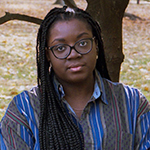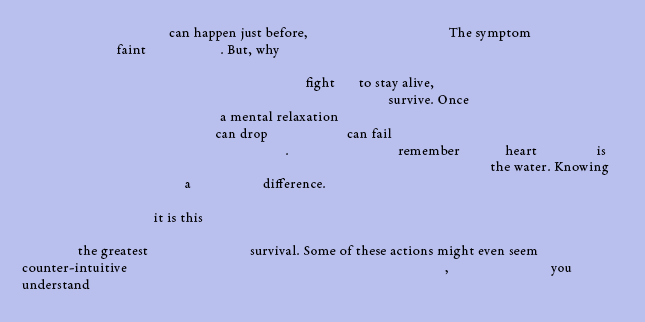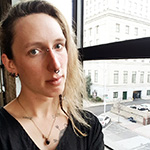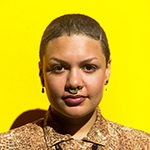What is known as paranoia or maladjusted self-defense
There is never any warning.
To be honest, I tend to create
the history after the fact,
once the face is shattered,
the bridge full of tumors
and rotting wood. I discover
the long-oozing sore, the burning
path that might suggest
a long-standing infection,
evidence which here
means, I am not paranoid;
see, the line of ash and arson,
collapsed metaphors that
might tug the condemnation
free, if only—if only—
but it has always been
this way, without warning,
after the first—suddenly
recognizing no one and finding
the weapon in all of it.
I am so afraid I am
embarrassed, attacked vividly
somehow, by every expression
that even creases their lips
to say, I swear, what I know,
what I know they must
believe about me, must
see across the glass, the
worst remains, bloodless,
heartless, an old, aging monster
perhaps. I lick my nails
until they glisten, slicing
the light to ribbons, clawing
the faces, the memories,
the open curtains and
upholstery, shattered glass
between my knuckles. Once
home, after, I swear, I know
I have defended something—like
myself, perhaps—I coddle
the lonely, rich with isolation,
near gluttonous with it, an
excess of self-absorption probably, but still,
the walls, now six guillotines high,
just as precise and unforgiving,
circle my wet body, supremely naked
and de-skinned, stinging and
joyous, cringing against the cold
air like a newborn, or something
feral and suddenly so clean it does not
recognize itself, beneath
the moonlight, tiny dots
of blood forming slowly atop
the freshly raw casing,
that skittish layer of under-flesh
that peels its eyes open, stunned
and aware—but calm, finally.
We called it a ‘war’ because it was useful, or Alternate Names for Teargas
after Danez Smith
1. blossoming poison
2. forced abandon (before the handkerchiefs)
3. coward’s fire
4. what came without warning, at first
5. the only indictment for miles
6. what came after a warning, eventually
7. America’s presumed mercy—which of course dissipates in the wind, which of course is a choking gratitude in the void of massacre, which of course is our most humble foreign policy
8. nightly ghost brand
9. perfume of the streets
10. measured plague and almost certainly someone’s evidence of god
11. permissible burning
12. summer baptism at the curb’s alter, anointed before heaven & hell & everything in between
13. an extended metaphor
14. front line testimony & bastard badge
15. not water hoses (yet/anymore) at least—which is almost certainly a kind of progress,
no?
Flatland
For Canfield
We were obnoxious lovers then.
Loud. Urgent. Seeping fists
through our sun-darkened skin.
A mass of questions marching
across the city, wailing against
the pavement and always returning,
prodigal-like, to the seed of the shattering.
This ravenous freedom, young, brave
and stubborn, so desperate to see itself
it presses everything into a mirror, warps
into a shrieking mouth when the glass breaks.
We loved you, loved you, loved you, lo-
ved you pressed against camera
screens, stoop niggas and gold teeth
strained through protest chants,
a child’s bicycle overturned
beneath our urgent, urgent feet.
The bowl of the neighborhood,
a temporary arena, displaced gladiator
stage where we bent our shoulders
towards the blood, thirsting for it,
drunk on any evidence that someone
like us was alive. That the face in the glass,
across the street, had a heartbeat, too. Once.
Jacqui Germain is a St. Louis poet and freelance journalist with work appearing or forthcoming in The Offing, Muzzle Magazine, Blueshift Journal, The New Inquiry, The Nation, Bettering American Poetry, and elsewhere. Her poetry often involves an excavation of history and memory, challenging linear assumptions of time, progress, power, and experience through an intimate lens. She is author of When the Ghosts Come Ashore, published in 2016 through Button Poetry, and has received fellowships from the Callaloo Creative Writing Workshop, the Poetry Foundation’s Emerging Poets Incubator, Jack Jones Literary Arts, and the St. Louis Regional Arts Commission. jacquigermain.com.



 BACK TO ISSUE
BACK TO ISSUE









